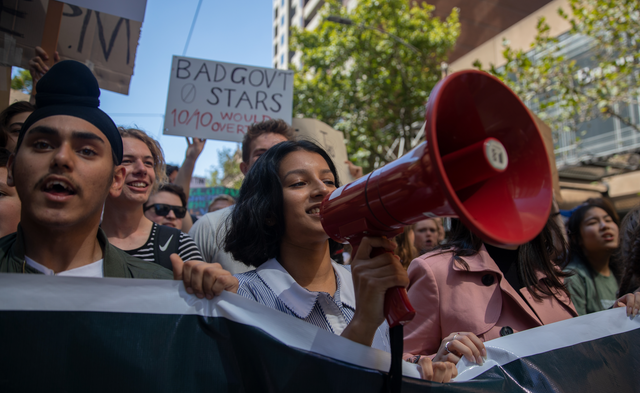At RED, the future of the planet is important to us.
We believe the actions we take over the next years are crucial. When just 100,000 people use Modibodi alone from the start of their menstrual cycle, 11 billion disposable hygiene products are prevented from ending up in landfill.
Recently we have been so inspired by the young voices that have speaking up and speaking out against climate change.
We reached out to some young Aussie activists that are taking a stand and shaking things up within their communities and around the world.
Maiysha Moin is a law student at Monash University, and a former organiser and MC for the Melbourne School Strike 4 Climate team. Maiysha continues her advocacy in other realms of activism including, but not limited to, women’s rights and social inequality. These are her words:

Generation Zoomers
This is us. Gen Z. The Zoomers. The generation who won’t be silent, or placated, but are actively solving the problems of today and tomorrow.
The very blood of our generation sings of revolution. Our lives were constantly shadowed by wars firing off in lands beyond the horizon of the Western world and the unmitigated fear of terrorism. During our childhood, we would time our showers with the plastic hourglass sent by our council to preserve water during the Millennial Drought. Just on the cusp of our teens, the Global Financial Crisis dominated the headlines and upended our families’ livelihoods.
It’s as though for our entire lives, from the moment we were born, the world has been in constant upheaval. We’re the first generation after WWII to have a poorer quality of life compared to our parents, not to mention to a looming environmental crisis, insecure work and an inaccessible housing market. Yet, these debilitating challenges haven’t deterred us from critically solving the biggest social issues of the 21st century.

Gen Z and Activism
Many young Australians are too young to vote and have instead found activism as a powerful tool to have their voices heard, engage with our democracy and lead change on the most pressing issues of the 21st century. We’ve utilised our skills to saturate all forms affecting positive social change, from grassroots movements to small businesses filling a sustainability lacuna. School Strike 4 Climate and Black Lives Matter are two profound and historical movements which foreground the power of youth today.
School Strike 4 Climate
Feeling disenfranchised and frustrated by the policy and leadership vacuum surrounding climate change, Castlemaine students in Victoria, Australia, inspired by Greta Thunberg, began School Strike 4 Climate, mobilising young people and the public to call for ambitious climate action. The movement made its debut at the 2018 strike, attracting 15,000 students across Australia. By its latest physical strike in September 2019, the movement had reached a fervent pitch: numbers surged to 300,000 across the nation. September’s strike saw unity across the board from unions, to Indigenous communities, to those working in fossil fuel industries. What we, young people, exemplify through this movement and these inundating numbers, is that we are able to reach across the political and social chasm to create a synergetic campaign. This movement is not just home to inner-city progressives, but also regional communities bearing the brunt of cataclysmic bushfires and fossil fuel workers seeking a cleaner energy industry. We create movements which belong to the people.
Additionally, the activism by young people is complemented by businesses which are founded on principles of sustainability and equality, such as Modibodi! The marry of modern technology and a sustainable vision in the design of Modibodi’s product range shows how the innovation of young entrepreneurs can combat the deep-rooted issue of landfill and fill the need for more environmentally focused businesses. Just like SS4C’s emphasis on climate justice, Modibodi also practices a vision of female empowerment and equality through their Give A Pair program, sharing dignity and confidence with women in need across Australia. The tools of affecting positive change, as you can see, are not limited to policy, but also within the economy.











